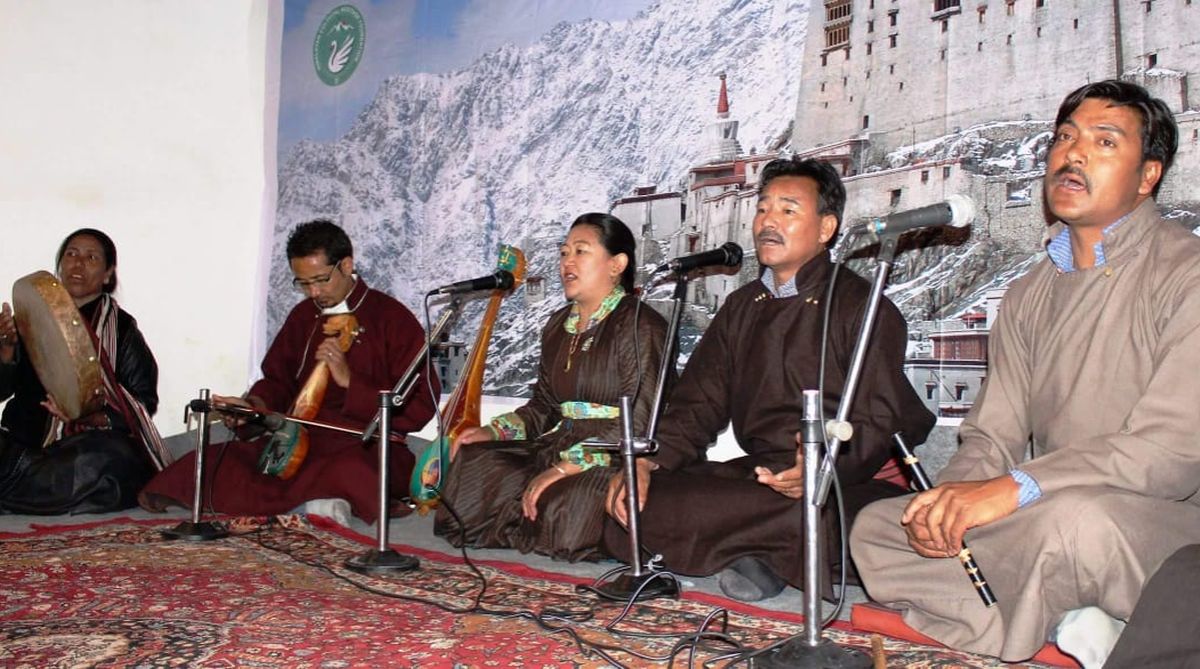A Leh-based NGO, Himalayan Cultural Heritage Foundation (HCHF), has for the first time initiated cultural programmes to showcase to foreign and domestic tourists the rich cultural heritage of the Buddhist-dominated area of Ladakh.
The HCHF also works extensively to revive dying monastic art, crafts, rituals and village handicrafts in the Himalayas. The foundation is laying stress on training and workshops that ensure more practical and beneficial outcomes both in terms of learning and preserving the rich cultural heritage of the Himalayas.
Advertisement
Sonam Wangchok, founder secretary of HCHF, said the NGO has initiated several programmes for preserving and promoting the intangible heritage of Ladakh.
As part of its activities, the HCHF has initiated a weekly “folk songs and music concert” in the historical Lonpo House, near Leh Palace every Friday. The weekly “folk songs and music concert” is the first of its kind in Ladakh where both local and foreign guests join to celebrate the invaluable intangible heritage of Ladakh by encouraging folk singers and musicians who are ensuring that this great body of accumulated cultural knowledge is not lost.
There are many important aspects of Ladakhi identity and culture, but traditional songs and their accompanying dances play a special role in shaping and sustaining a distinctly Ladakhi way of life and outlook, Wangchok said.
It is through song and dance that the mountain people have kept alive accounts of their great leaders, saints and heroes, as well as related stories of the lives and struggles of ordinary people.
“Our culture is an oral one, songs have long been a primary way to pass on knowledge and values from generation to generation. Through song and dance the mountain communities have passed on local histories, conveyed spiritual values, and acknowledged the profound beauty and importance of nature and we wanted to create an opportunity, especially for outside guests to listen to them while they are in Ladakh”, said Wangchok.
Appreciating the initiative, Sabrina, a German tourist said Ladakhi folk songs are beautiful. “This is the most peaceful place on this earth! I also love the atmosphere, the mountains, the music and the lovely people herem,” Sabrina wrote in the visitors’ book. The audience also appreciated Wangchok for sharing his invaluable background knowledge of folk songs and music that adds an extra splendour to the concerts.
Ladakh’s famous singers like Dorjay Stakmo, Padma Dolker, Stanzin Sherab, Kunzes Dolma, Tsewang Dolma and Tsering Angchuk take audiences on a journey to a Ladakh of yore during the concert.
Folk musicians Angdu Dorjey, Motup and Lhadol perform with ancient musical instruments like Daab, Piwang, Damnyan and flute. HCHF is also planning to hold workshops to impart the skill of playing endangered musical instruments to the youth of Ladakh.
HCHF is a community-based, non-government organisation, devoted to preserve and promote Himalayan indigenous, natural and historic heritage by working directly with the different mountain communities and strengthening and supporting community-based institutions.
HCHF has made concerted efforts to document the heritage of Ladakh, including folklore, traditional songs, music, dance and folk stories. The foundation also carried out several conservation projects and successfully restored important heritage sites in Ladakh.
According to Wangchok, “My Culture-My Heritage” is a project designed by HCHF for young people to study culture and heritage through talks, visits to heritage sites, discussions, documentary films, interviews, writing competitions and other activities. Under this project the youth get a chance to write and express their views and concern about their culture and heritage.
Their works and researches will be published in the heritage magazine Heritage Himalaya. This field research will encourage young people to learn about their culture and heritage from their elders.
Under the project they will also have a chance to express what they already know about their culture and heritage and more importantly it will persuade them to work to safeguard them.











